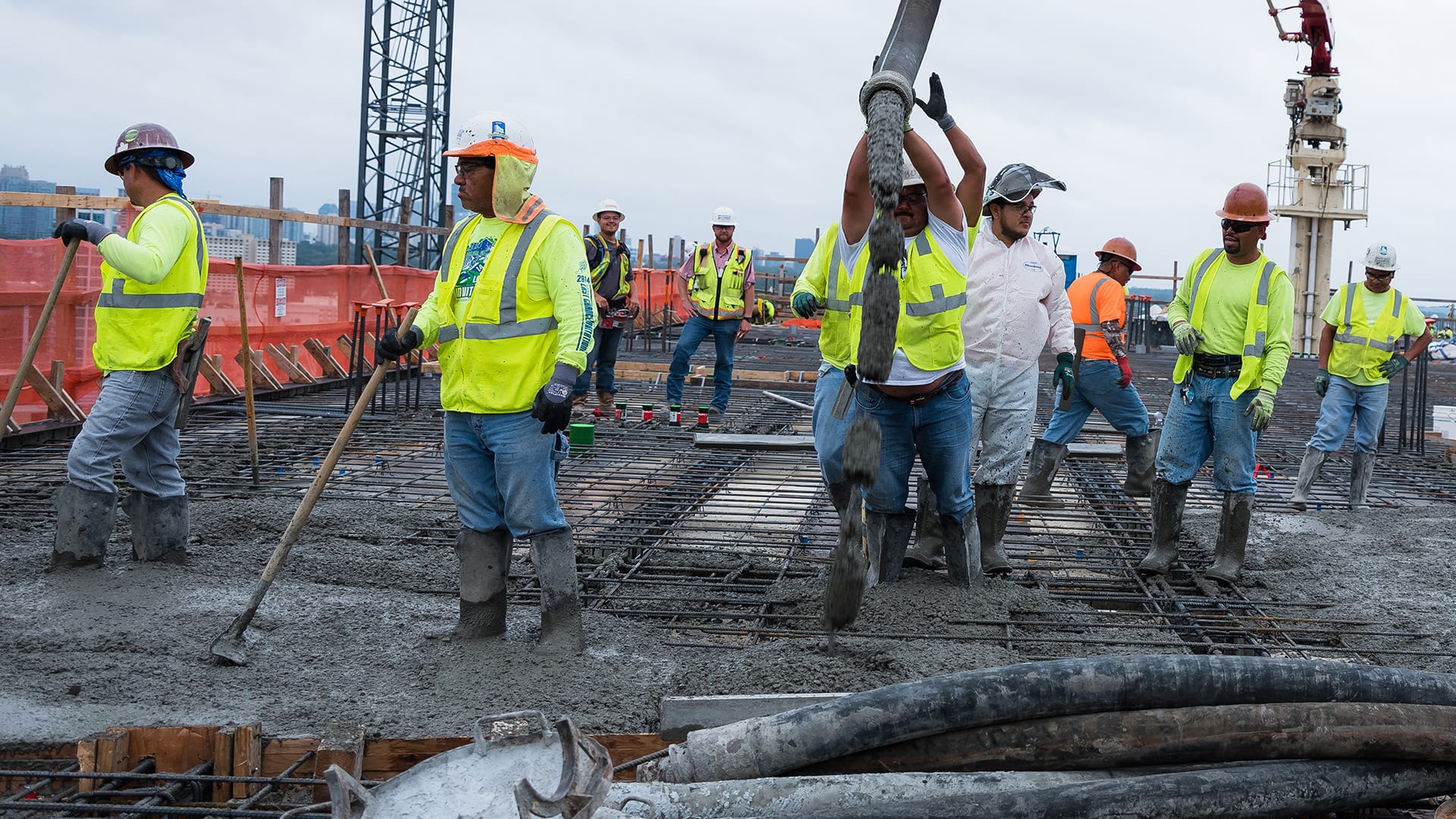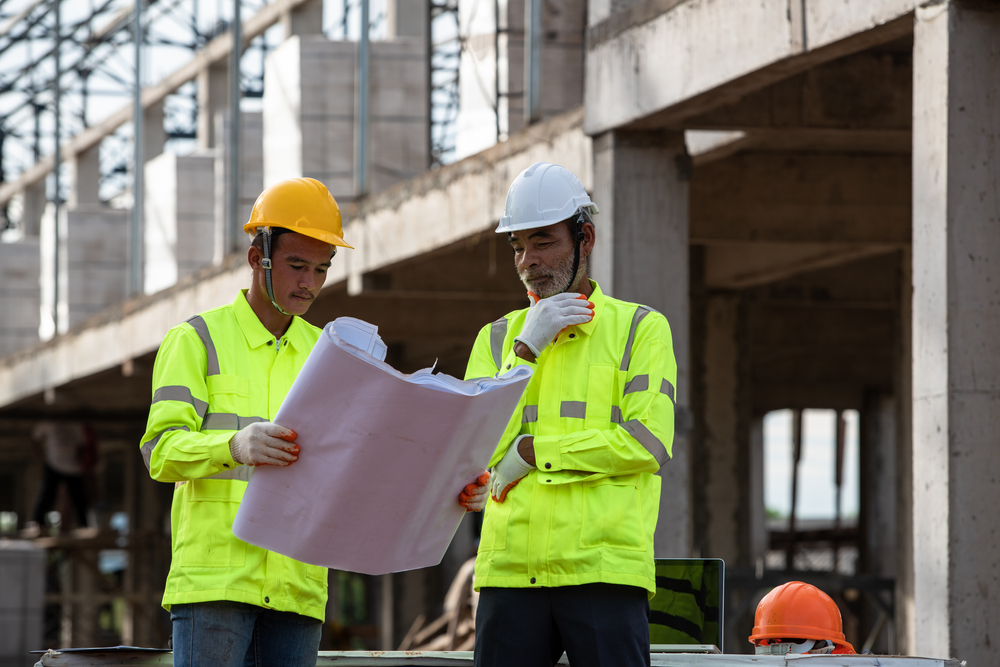5 Questions You Must Ask Your West Coast GE Concrete contractors Before Breaking Ground
5 Questions You Must Ask Your West Coast GE Concrete contractors Before Breaking Ground
Blog Article
The Essential Function of Concrete Structure in Structural Integrity and Longevity
When it pertains to building a home, the structure is more important than you might think. Concrete foundations supply unparalleled toughness and sturdiness, guaranteeing your framework can withstand different environmental difficulties. Without a solid base, you take the chance of potential issues like moving or splitting, which can jeopardize safety and security and worth. Recognizing the subtleties of concrete structures might be the secret to protecting your financial investment for several years ahead. So, what should you consider following?
Recognizing the Relevance of Concrete Foundations
Concrete structures are crucial to the general stability of any structure, as they offer the vital support needed to withstand numerous lots and ecological problems. When you think of building a home or a business area, the foundation is the first thing you should think about. It serves as a barrier versus wetness, protecting your home from water damages. A well-placed concrete foundation also protects against settling and changing, which can result in cracks in wall surfaces and floorings. You'll wish to guarantee that the foundation is effectively made and enhanced, as this influences the durability of your building. Additionally, a solid structure can boost energy efficiency by decreasing air leakages. Remember, ignoring the importance of a concrete foundation can lead to costly repairs down the line. So, spending in a quality foundation upfront is crucial for the honesty and durability of your structure.
Benefits of Concrete Structures for Architectural Integrity
While lots of factors add to a structure's structural stability, concrete structures offer unequaled durability and stamina. You'll value that concrete can withstand extreme climate condition, standing up to both moisture and temperature changes. This strength suggests your structure is much less most likely to experience cracking or moving gradually, which can compromise its safety.Additionally, concrete's fundamental weight supplies a strong base, protecting against activity throughout natural occasions like earthquakes or floods. When you choose a concrete foundation, you're also choosing low maintenance; unlike wood, it won't rot or attract insects, saving you money and time in repairs.Moreover, concrete's fire resistance uses included safety, ensuring your structure can endure heats without substantial damages. On the whole, buying a concrete structure indicates you're prioritizing the lasting security and honesty of your structure, making it a smart option for any construction task.
Usual Kinds Of Concrete Foundations
When it comes to building structures, recognizing the usual kinds of concrete foundations can help you make informed choices for your task. One of the most common types consist of slab-on-grade, crawl room, and full basement foundations.A slab-on-grade structure is a simple, cost-efficient alternative, where a thick concrete piece is put straight on the ground. This kind works well in warm climates, as it decreases warmth loss.Crawl area structures elevate the home slightly over ground, enabling for ventilation and accessibility to pipes and electrical systems. This design can aid protect against wetness issues.Full basement structures use extra living or storage room while supplying exceptional structural assistance. They call for more excavation and are generally made use of in chillier climates to stop frost heave.
Variables to Take Into Consideration When Designing a Concrete Structure

Ideal Practices for Setting Up Concrete Foundations
When you're mounting a concrete structure, proper website prep work is necessary to guarantee security (West Coast General Engineering commercial concrete). You'll additionally require to understand support strategies to enhance stamina and durability. Lastly, do not overlook the treating procedure, as it plays a basic role in accomplishing a strong structure
Website Prep Work Relevance
Although it might seem uncomplicated, correct website prep work is essential for assuring a solid and durable concrete foundation. Begin by removing the location of any type of debris, vegetation, or organic material that could jeopardize the structure's honesty. Next off, evaluate the soil type and compaction; you could need to excavate or include products to create a steady base. Degree the ground to ensure even weight distribution and avoid settling issues in the future. Mounting proper drain systems is additionally important to prevent water build-up, which can weaken the foundation gradually. Lastly, define the structure's dimensions precisely to direct the putting process. By adhering to these steps, you'll establish the phase for a successful concrete foundation that stands look at this now the examination of time.
Reinforcement Strategies Clarified
When the site is appropriately prepared, the following step in assuring a durable concrete structure includes carrying out reliable reinforcement methods. You must start by using steel rebar, which offers tensile strength and assists prevent splitting. Lay the rebar in a grid pattern, making sure it rises making use of spacers to keep proper insurance coverage. In addition, think about utilizing cable mesh for additional support, especially in locations subject to heavy loads. Do not forget to connect the rebar crossways safely with cable. For bigger foundations, fiber reinforcement can improve toughness, lowering the risk of shrinking splits. Always follow neighborhood building ordinance and standards to guarantee compliance. By applying these reinforcement strategies, you'll substantially boost your structure's toughness and durability, laying a solid groundwork for your structure.
Curing Refine Essentials
To guarantee your concrete structure cures appropriately, it is necessary to keep adequate dampness and temperature conditions immediately after putting. Beginning by covering the surface area with a wet burlap or plastic sheeting to preserve wetness. This maintains the concrete hydrated, protecting against cracks and guaranteeing visit strength. You must also check the temperature; ideal treating problems are between 50 ° F and 90 ° F. If it's as well hot, mist the surface frequently to stop rapid dissipation. For winter, think about making use of insulating coverings to preserve warmth. Aim for a healing duration of at least 7 days, as this is vital for ideal strength growth. By complying with these ideal techniques, you'll boost your foundation's durability and durability, making sure architectural integrity for several years to come.
Upkeep of Concrete Structures for Longevity
To keep your concrete structure solid and enduring, normal inspections are essential. You must additionally assure efficient drain services remain in place to stop water damages. If you identify any kind of fractures, resolving them quickly will conserve you from bigger troubles down the line.

Regular Inspections and Assessments
While regular inspections and analyses may appear like a chore, they're necessary for preserving the honesty of your concrete structure. By routinely looking for splits, shifts, or indicators of wear, you can capture possible concerns prior to they rise into expensive repairs. Try to find any type of water merging around the structure or unusual settling, as these can indicate underlying problems. It's also smart to keep track of any kind of changes in your home's framework, like doors that stick or home windows that don't open smoothly. Maintaining a record of your examinations helps track changes with time, permitting for aggressive maintenance. Ultimately, these assessments guarantee your foundation continues to be steady, supporting the longevity and safety of your whole structure. Do not ignore this essential facet of homeownership!
Effective Drainage Solutions
Normal inspections can expose issues like water drainage problems that could endanger your concrete foundation's stability. To avoid water accumulation, guarantee your gutters and downspouts direct water away from the structure. Installing French drains pipes can properly redirect surface area and groundwater, minimizing pressure on your foundation walls. Additionally, grading the soil around your home aids ensure that water moves away, as opposed to merging near your foundation.Consider making use of sump pumps in locations prone to flooding, as they actively eliminate excess water. Consistently look for clogs in water drainage systems and clear them immediately. You'll shield your structure's stability and long life by taking these aggressive measures. Remember, efficient water drainage options are necessary for preserving a strong, resilient concrete foundation.
Motivate Split Fixes
When you discover fractures in your concrete foundation, resolving them immediately is vital for preserving its durability. Little splits can quickly advance into bigger issues, jeopardizing the architectural integrity of your home. Routinely check your structure for indicators of damages, such as horizontal or vertical fractures. If you detect any type of, don't wait-- repair them promptly. You can utilize epoxy injections or concrete patching substances, which are efficient for sealing cracks. Always adhere to the supplier's guidelines and consider consulting an expert for significant damages. Bear in mind, timely repairs not only enhance your structure's durability yet also save you money in the lengthy run by stopping extra comprehensive repair services down the line. Keep proactive, and your structure will certainly continue to be solid and safe.
Dealing With Common Problems With Concrete Structures
Concrete foundations can face numerous concerns gradually, making it essential check that to recognize and resolve them quickly. Among one of the most usual troubles is cracking, which can happen as a result of temperature level changes or resolving soil. If you notice splits, it's necessary to assess their size and depth; tiny fractures can frequently be sealed, while bigger ones may call for expert evaluation.Water breach is another significant issue. Excess dampness can lead to mold and mildew development and structural wear and tear. Assurance proper drain around your foundation to minimize this threat. Furthermore, try to find signs of shifting or bowing wall surfaces, as this can show underlying problems with your foundation's stability.Regular evaluations are basic to catch these troubles early. If you identify any kind of worrying indicators, don't think twice to seek advice from a foundation professional. By remaining positive, you can keep the integrity and longevity of your concrete structure, ensuring your home continues to be risk-free and secure.
Regularly Asked Questions
Exactly How Does Dirt Type Affect Concrete Foundation Performance?
Dirt kind substantially impacts concrete structure performance. If you have actually got large clay, for example, it can trigger changing and splitting. Sandy soil could bring about working out. Understanding your dirt aids ensure a secure structure.
Can Concrete Foundations Be Fixed if Damaged?
Yes, you can fix broken concrete foundations. Depending upon the extent of the damage, methods like epoxy injection or piece jacking can bring back security. It's best to seek advice from a professional for efficient services.
What Is the Regular Life-span of a Concrete Foundation?
A concrete structure typically lasts 30 to 100 years, depending on factors like dirt problems, environment, and maintenance. You'll wish to watch on it to guarantee it remains in great form throughout its life-span.
Exist Choice Materials to Concrete for Foundations?
Yes, there are alternatives to concrete for structures, like steel, timber, and even recycled products. Each option has one-of-a-kind advantages and downsides, so you need to consider your job's certain requirements when choosing the right material.
Exactly How Does Environment Impact Concrete Foundation Toughness?
Climate considerably impacts concrete structure sturdiness (West Coast General Engineering commercial concrete). Severe temperatures, wetness, and freeze-thaw cycles can weaken the material, leading to cracks and structural problems. You need to consider neighborhood climate conditions when preparing your foundation to guarantee long-lasting efficiency
Report this page